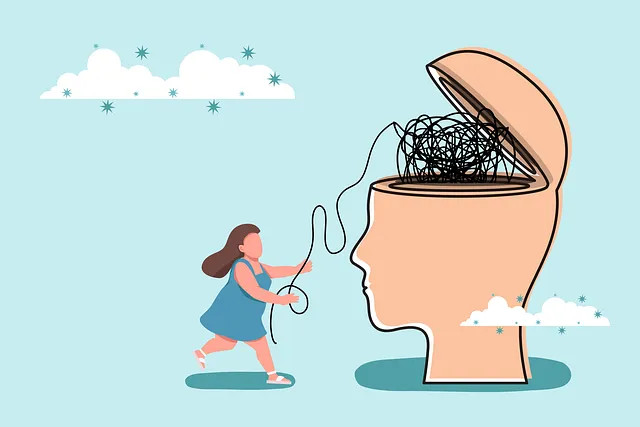Social skills training is a crucial component of managing mental health conditions, particularly in inpatient settings like Kaiser's facilities in Parker. Kaiser offers specialized programs using evidence-based Mind Over Matter Principles that focus on communication, stress management, assertiveness, and coping strategies. These programs integrate mood management techniques (mindfulness, CBT), emotional intelligence development, and burnout prevention for healthcare providers. Social Skills Training (SST) reduces anxiety symptoms, boosts self-confidence, and increases social connectivity, ultimately promoting better mental well-being and relationship building for individuals with mental health conditions.
Social skills training is a powerful tool in supporting individuals with mental health conditions, offering a unique approach to enhancing their overall well-being. This comprehensive guide explores the intricate link between social abilities and mental health, highlighting the essential role of programs like those provided by Kaiser Inpatient Mental Health Services. We’ll delve into key components making these programs effective and discuss the remarkable benefits and outcomes for participants, focusing on strategies that can empower individuals to navigate social interactions with confidence.
- Understanding the Link Between Social Skills and Mental Health
- The Role of Kaiser Inpatient Mental Health Services for Social Skills Training
- Key Components of Effective Social Skills Training Programs
- Benefits and Outcomes of Social Skills Training for Individuals with Mental Health Conditions
Understanding the Link Between Social Skills and Mental Health

Social skills training is a vital component in managing mental health conditions, especially for individuals seeking inpatient care, such as those treated at Kaiser’s facilities. The link between social skills and mental well-being is profound; lacking adequate social interaction or possessing impaired communication skills can exacerbate existing conditions like depression, anxiety, or PTSD. These disorders often manifest as social withdrawal, making it a vicious cycle where poor social skills contribute to and are exacerbated by mental health struggles.
At Kaiser or any other healthcare provider, inpatient mental health services include Trauma Support Services designed to help patients navigate and overcome traumatic experiences, which can significantly impact social functioning. Mood Management programs also emphasize the importance of social skills training in stabilizing emotions and promoting healthy relationships. In light of these initiatives, Mental Health Policy Analysis and Advocacy groups continue to push for more inclusive care that recognizes the interdependence of social health and mental stability.
The Role of Kaiser Inpatient Mental Health Services for Social Skills Training

Kaiser Inpatient Mental Health Services plays a significant role in providing specialized care for individuals struggling with mental health conditions. One of their key offerings is social skills training, designed to empower patients with practical tools for effective communication and building healthy relationships. This training incorporates evidence-based Mind Over Matter Principles, fostering self-awareness and resilience.
Through structured programs and workshops, Kaiser helps patients navigate social interactions with confidence. Topics may include stress management techniques from the Public Awareness Campaigns Development initiatives, improving assertiveness, and developing coping strategies for various mental health challenges. By integrating these skills into daily life, individuals can better manage their conditions and enhance overall well-being.
Key Components of Effective Social Skills Training Programs

Effective social skills training programs for mental health conditions are multifaceted, targeting key areas to enhance participants’ overall well-being. Firstly, these programs should prioritize Mood Management techniques, equipping individuals with tools to regulate their emotions and navigate triggers effectively. This could include mindfulness practices, cognitive behavioral therapy (CBT) strategies, and stress reduction techniques tailored to each individual’s unique needs.
Secondly, incorporating Emotional Intelligence training is vital. By fostering self-awareness, empathy, and appropriate social expression, individuals can improve their relationships and overall social functioning. Role-playing scenarios, group discussions, and feedback sessions create a safe environment for practicing these skills. Additionally, integrating Burnout Prevention Strategies for Healthcare Providers can benefit both patients and practitioners, creating a supportive ecosystem that encourages open communication, resilience, and self-care—all essential components of successful social skills training in mental health settings, including those offered by Kaiser’s inpatient facilities at Parker.
Benefits and Outcomes of Social Skills Training for Individuals with Mental Health Conditions

Social Skills Training (SST) offers profound benefits and outcomes for individuals navigating mental health conditions, such as those sought by patients at Kaiser’s inpatient mental health facilities in Parker. SST equips individuals with essential tools to navigate social interactions, fostering better communication, empathy, and understanding. This tailored training addresses the unique challenges faced by those with anxiety, depression, or trauma, enhancing their ability to build and maintain meaningful relationships.
One of the key advantages lies in its potential to alleviate symptoms of Anxiety Relief, a common struggle for many seeking mental health support. By honing emotional intelligence, SST enables individuals to better manage stress, regulate emotions, and interpret social cues accurately. This improved Emotional Intelligence (EI) can lead to enhanced self-confidence, reduced social isolation, and better coping mechanisms, ultimately contributing to improved overall well-being. Furthermore, effective SST can serve as a powerful Risk Management Planning tool for mental health professionals, ensuring their clients develop the skills necessary to thrive in various social environments.
Social skills training, particularly through programs offered by comprehensive healthcare providers like Kaiser Inpatient Mental Health Services in Parker, plays a pivotal role in improving outcomes for individuals with mental health conditions. By focusing on key components such as communication, empathy, and social interaction strategies, these programs empower participants to navigate social environments more effectively. The benefits are substantial, leading to enhanced relationships, increased self-confidence, and improved overall mental well-being. For those seeking specialized support, Kaiser’s inpatient services in Parker stand out as a valuable resource, offering tailored training that can significantly transform lives.






